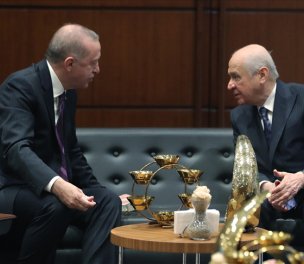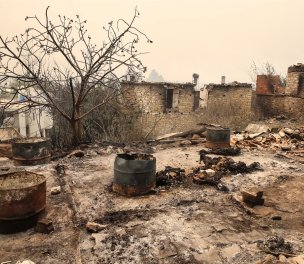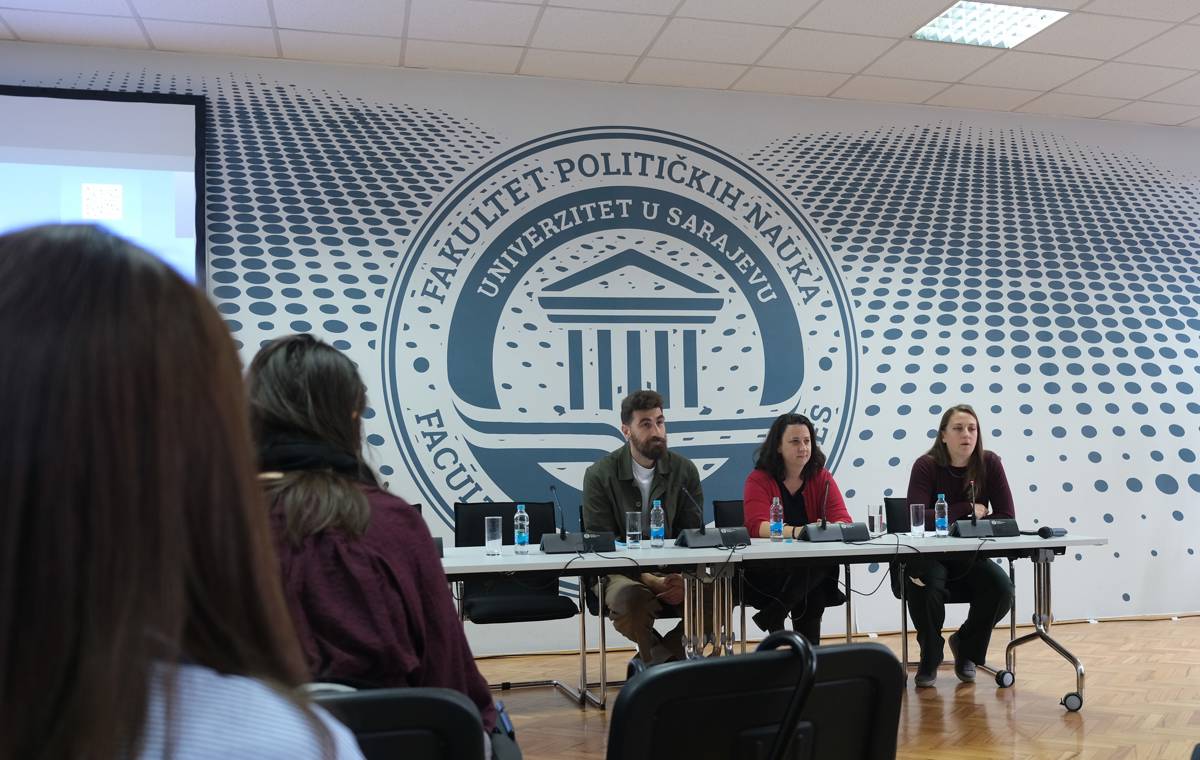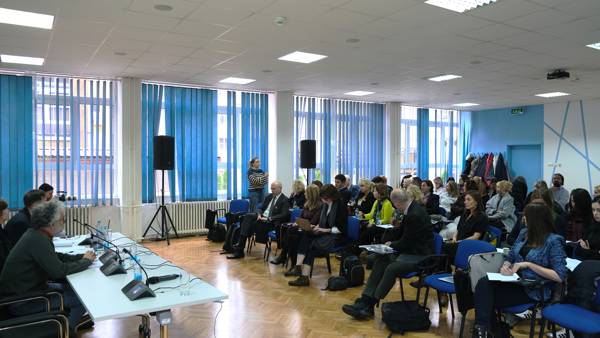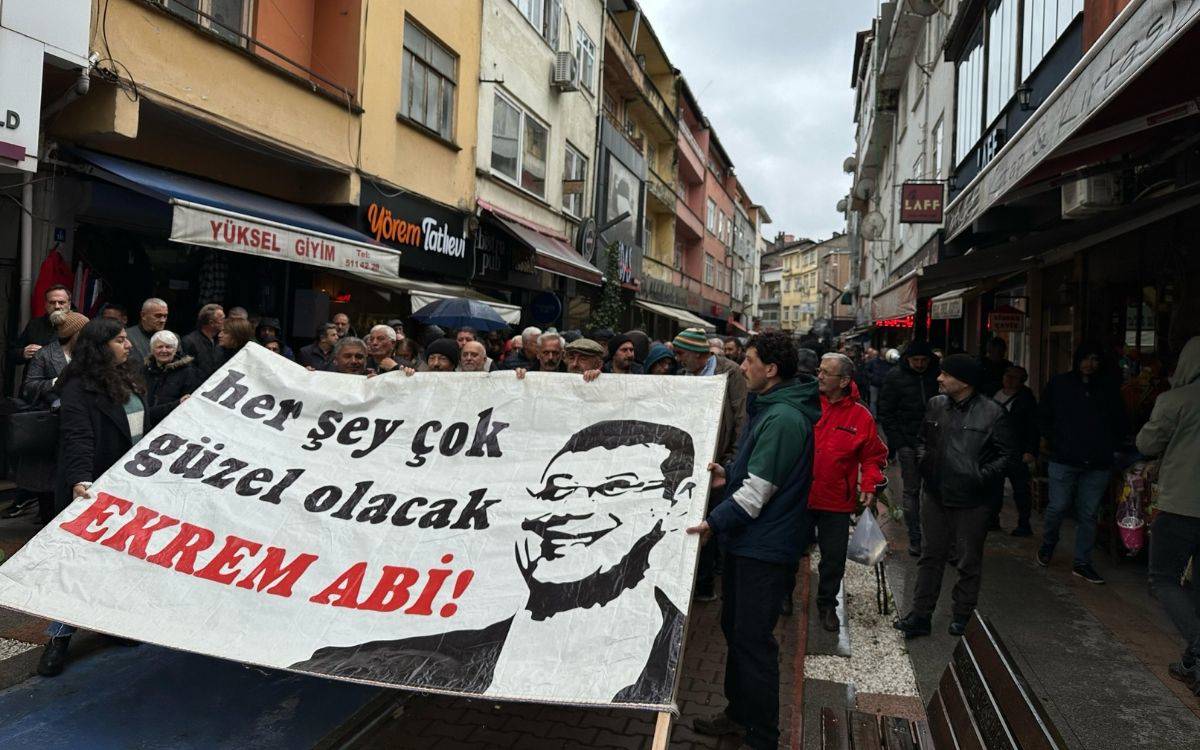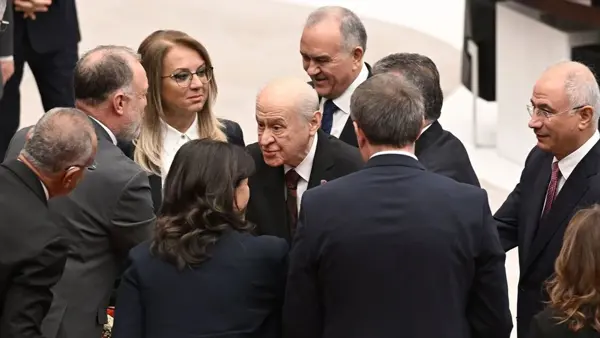Erdoğan at a meeting of his party in Adana on October 9. (Photo: AA)
bianet's weekly summary of important events in Turkey:
Violence and vengeance
President Recep Tayyip Erdoğan's popular support is at the lowest level of his 19 years in power. According to all major pollsters, his Justice and Development Party (AKP) has been consistently losing votes since late 2020 and at least two potential opposition candidates have a comfortable lead over him.
However, the period until the elections, which are scheduled for June 2023, may not be so smooth, according to some, including the leader of the main opposition Republican People's Party (CHP).
Erdoğan would try everything to remain in power and would likely try to further polarize society before the elections, Kemal Kılıçdaroğlu told reporters on October 6.
"Political murders... I have such concerns," he said. "Erdoğan said, 'Many more things will happen to you.' If a person who holds all the power of the state says such a thing, it's very dangerous. He is openly threatening."
Erdoğan made those remarks in late May, after an attempted attack against İYİ (Good) Party Chair Meral Akşener, an ally of the CHP, in his hometown Rize.
"This is only the first one. Many more things will happen, these are the better days," he had said.
Weeks later, an armed assailant stormed the Kurdish issue-focused Peoples' Democratic Party's (HDP) office in İzmir, western Turkey, and killed a party worker. The assailant was apparently a sympathizer of the Nationalist Movement Party (MHP), the allies of Erdoğan's AKP, according to his social media posts.
Within a month, the HDP was targeted in an another armed attack in the southwestern province of Muğla, this time with no casualties.
Read more:
Prison sentence for death threat against Kılıçdaroğlu
Two journalists and a politician attacked in front of their homes
MHP's Bahçeli calls killed HDP member 'a militia accomplice'
'Don't underestimete MHP': Bahçeli threatens Davutoğlu, journalists
AKP member threatens journalist Murat Ağırel with death
More recently, the president said it would be better for the opposition to give up seeking to rule the country.
"Of course, we don't expect a party whose municipalities are shaken with claims of thievery, corruption, immorality, harassment and rape to appreciate the wage rises we have provided for employees. But at least, we'd like to remind them giving up saying that they aspire to govern the country by citing these places of disgrace as an example would be better for them," he told his party members on October 7.
Following Kılıçdaroğlu's statements, several opposition politicians voiced similar concerns. İYİ Party Deputy Chair Koray Aydın said on October 11 that they had received information that such attacks might happen.
The AKP immediately denied these claims with its Spokesperson Ömer Çelik saying that Kılıçdaroğlu's statements were "immoral and irresponsible."
The AKP, in fact, was the party that ended the era of extrajudicial killings in Turkey, he wrote on Twitter.
Minister of Interior Süleyman Soylu said on October 13 that they had received no such intelligence. On the same day, the Ankara Chief Public Prosecutor's Office opened an ex-officio investigation into Kılıçdaroğlu's claims.
The AKP's two decades in power was not marked by widespread political violence unlike the 1990s where thousands of people had lost their lives in extrajudicial killings, mostly in predominantly Kurdish-populated regions. However, the impunity of those responsible for those atrocities continued in the AKP era.
Also, there were cases such as the assassination of Armenian journalist Hrant Dink in 2007 and the killing of Diyarbakır Bar Association Chair Tahir Elçi in 2015, as well as an attempted lynch against Kılıçdaroğlu at the funeral of a soldier in 2019.
Pens and swords
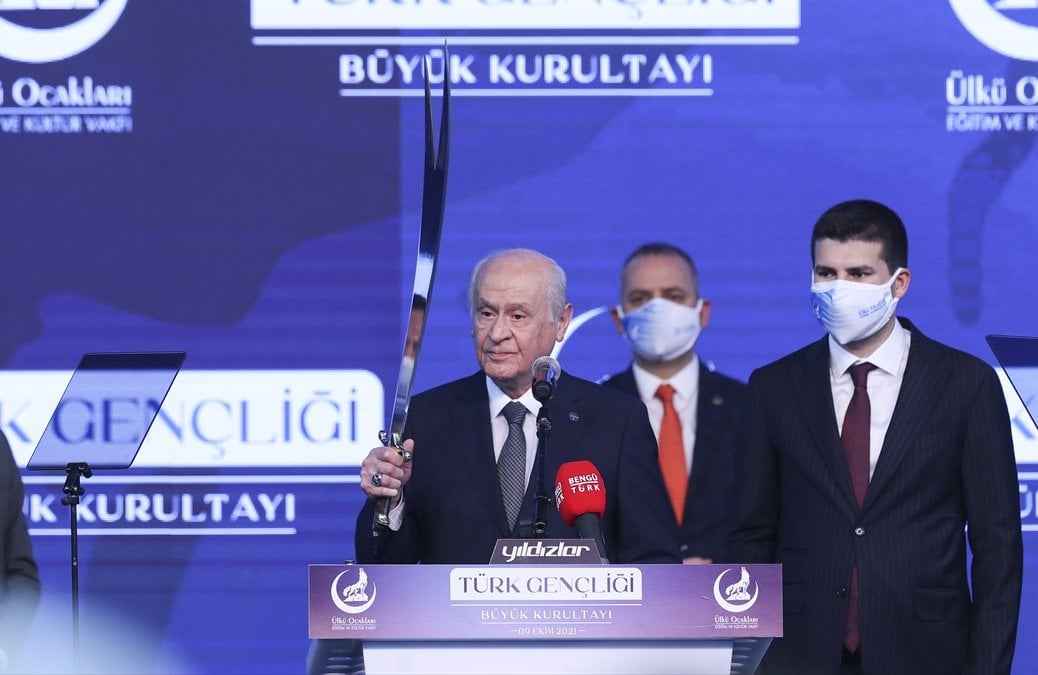 Photo: AA
Photo: AA
On October 9, MHP Chair Devlet Bahçeli implicitly urged his party's youth movement, the Grey Wolves, to be prepared to fight. "Always have a pen in your hand. But, when necessary, also have a zulfiqar in your hand," he remarked while displaying a zulfiqar, a double bladed sword used by the cousin of prophet Muhammad, Ali ibn Abu Talib.
Three days later, he accused Kılıçdaroğlu of fearmongering and called his statements "fairytales."
On October 15, Erdoğan said Kılıçdaroğlu is a person who "lies night and day" and called on him to share kis knowledge, if he has any, with judicial authorities.
President Erdoğan's attorneys yesterday filed an application with the Ankara Chief Public Prosecutor's Office, demanding statements be taken from those who made the claims, including Akşener and Kılıçdaroğlu. Also yesterday, İYİ Party's Aydın had a phone conversation with the prosecutors about the issue, his advisor told Halk TV.
The worried conservatives
Opposition leaders are not the only ones those who are worried about the country's near future.
"The worried conservatives" is a term that has been circulating in the country's political discussion over the past few months. It refers to AKP voters, including those who are not happy with the party's rule now, who are concerned that the opposition parties might aggrieve them if they assume power.
İhsan Dağı, an academic and columnist who had supported the AKP for over a decade, wrote in an article on Diken news portal that "They are concerned because they have a lot to lose now; offices, wealth, power, social position, political influence, vanity, self-confidence..."
The concerns may not only be about privileges but also about rights, most notably the right to wear a headscarf, which was restricted before the rule of the AKP. To keep the memories of the 1990s fresh, Erdoğan and the AKP often recall the headscarf ban in the public sector and universities, as well as the 1997 "postmodern coup" against the Welfare Party (RP), the predecessor of the AKP.
The two splinter movements from the AKP, the DEVA Party and the Future Party, have also addressed these concerns, trying to assure voters that they won't let the people's acquired rights to be taken away from them if the AKP loses power. Both parties have stated that they won't ally with the AKP and have been in close contact with the opposition alliance.
A recent poll showed they might have a point as about 70 percent of the AKP voters stated that they would feel threatened if the AKP lost power.
In its September survey, Metropoll company asked respondents several questions about the issue.
When asked, "Do you think your way of life will come under threat if the Nation's Alliance, which is formed by the CHP and the İYİ Party, wins the election?" 69.2 percent of those who stated that they would vote for the AKP in the next election replied "yes" while 26.3 percent said "no."
Overall, 36.3 percent of the respondents said "yes" to this question and 56.2 percent said "no."
Also, 70.7 percent of the AKP voters and 33.2 percent of all voters think religious people would face repression under the rule of the CHP and the İYİ Party, according to the survey. Over 72 percent of the AKP voters think they would be discriminated against if the opposition alliance took power.
These rates were not as high among the MHP voters but were still over 50 percent.
On the other side of the coin, the "worried conservatives" do not make up the majority of voters in Turkey, which means playing on their fears alone would not gain the AKP the support it has lost.
For their part, the CHP and the İYİ Party have said they won't bring back the headscarf ban and interfere with religious people's life styles but will hold those involved in corrupt and illegal practices accountable if and when they take power.
| HUMAN RIGHTS |
Turkey tops global human smuggling, arms trafficking rankings
The country's criminality score is higher than any other county in Europe, according to the Global Organized Crime Index 2021
2015 ISIS bombings in Diyarbakır
Four police officers have been sentenced to prison for "neglect of duty" while 10 have been acquitted in the case concerning the deadly bombings targeted a HDP rally
Commemorating Ankara Massacre: Police violence for six years
When people wanted to commemorate the 103 people killed in a bomb attack in Ankara in 2015, police used tear gas in the first two years. A limited attendance was allowed next year. The ceremony in 2020 was not allowed "due to pandemic
Arbitrary book ban against imprisoned journalist Nedim Türfent
A book sent to imprisoned journalist Nedim Türfent was arbitrarily not delivered to him. The letter that he wrote about this was also censored by the prison letter committee
Gülistan Doku case: 'We are searching for the truth, not a killer'
Gülistan Doku, 21, has been missing since January 2020. The stepfater of the chief suspect, a homicide police officer, was dismissed from the profession after disclosing private information about Doku to prove that she was not killed but committed suicide
Thirty union members acquitted of 'terrorism' after 12 years of trial
The case was retried after the Constitutional Court ruled in 2015 that the KESK members' rights were violated
| LABOR |
Company recognizes union after workers lock themselves in factory
In protest of the firings of 10 union workers, 130 workers locked themselves in the factory. The company has accepted to start negotiations for a collective agreement
Explosion at chemical plant claims one worker's life in Bursa
Six workers were injured in the explosion and about 15 were mildly affected by chemical gases that were released after the explosion
300 textile workers fired for being unionized to be reinstated
All workers in a textile company in Urfa, southeastern Turkey, will be reinstated after being fired because of becoming members of the DİSK Textile Workers Union
Grocery shopping trips of two families highlight food inflation
The two families had to spent a significant part of their retirement pensions in a single shopping trip to buy only fruits, vegetables and bread
| POLITICS |
A journalist shared documents allegedly leaked from TÜGVA, a foundation of which President Erdoğan's son is among the founders. The documents include lists of people to be placed in state institutions, including the judiciary, ministries and security forces. TÜGVA rejects the authenticity of the documents and says there is a "plot" against it
Merkel's farewell visit to Erdoğan
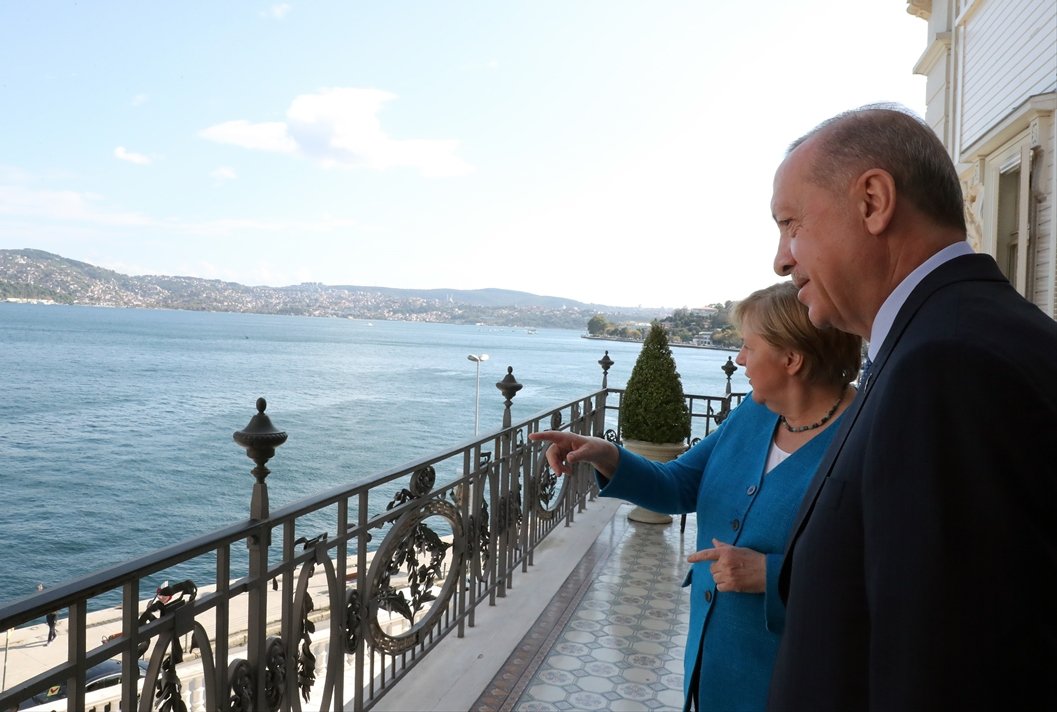
Erdoğan hosted Germany's outgoing chancellor at a presidential mansion overlooking the Bosphorus. The two have had a good relationship over the past 16 years
| FREEDOM OF EXPRESSION |
Likening Erdoğan to 1980 coup general is 'free expression'

Prosecutors have decided not to prosecute lawyer Efkan Bolaç for a social media post that included a drawing of President Recep Tayyip Erdoğan and late General Kenan Evren, who led the 1980 military coup
Former HDP deputy Aysel Tuğluk sentenced to prison
The Kurdish politician who has already been bars since 2016 has been convicted of "terror propaganda"
A social media user was fined for calling the MHP leader a "dotard." His attorney says no case would be filed had he called him "demented" instead
| ENVIRONMENT |
Turkey now has a climate change ministry
'Climate change' has been added to the name of the Ministry of Environment and Urbanization
| TOP READS |
Editors' potential power: Restoring trust in the media
With the participation of over 30 editors from the Western Balkans and Turkey, the Editors' Forum in Montenegro aimed to stress the potential power of editors in restoring trust in the media in the face of hate narratives, disinformation, propaganda. Selay Dalaklı writes...
"I think journalism is about finding out how they are made," Pınar Tarcan said in her speech at "Editors for Trust" forum held in Montenegro as part of the Resilience project on October 13-16, 2021
From constructive journalism to peace journalism
"I still believe that as a person working for a rights-based media outlet, I can share our own experience of peace journalism at bianet as an example of how constructive journalism can be practiced in a context with a mounting pressure on rights and freedoms," Selay Dalaklı said in her speech at "Editors for Trust" forum.
The government's apetite for armament
"The share of Turkey's military expenditues in its GDP rose from 2.4 percent to 2.8 percent in 15 years while it decreased in all of the surrounding countries. Do we have to buy so many weapons? What are we giving up to buy so many weapons? Is it possible to both fill the country with this many weapons and to combat poverty?" writes Bülent Danışoğlu
"The war didn't end. It started. It started when all my research papers about home and women's development became irrelevant, like the poems you write for someone you love that no longer serve a purpose when they are gone," writes Nazeela Elmi
(VK)




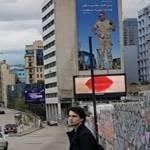
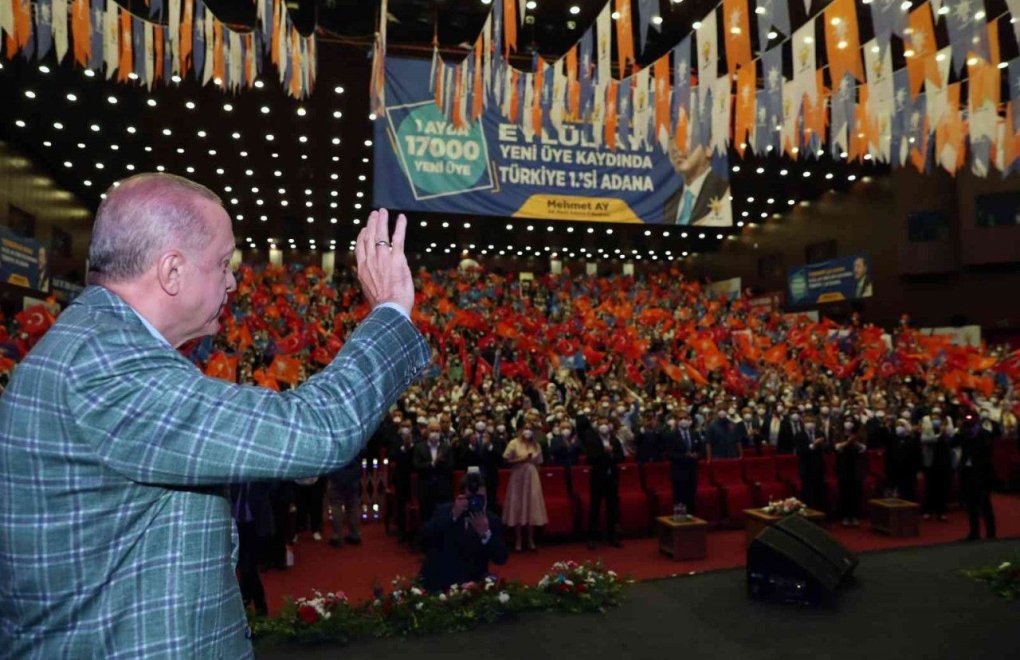

sa.jpg)
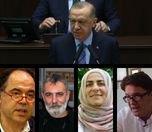

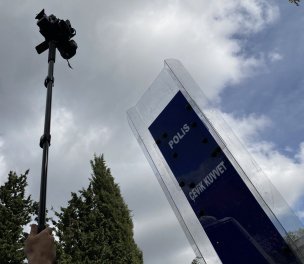
sa.jpg)
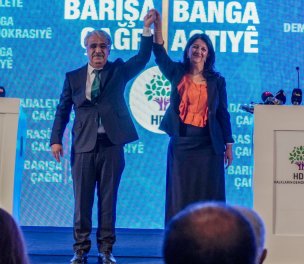
as.jpg)
